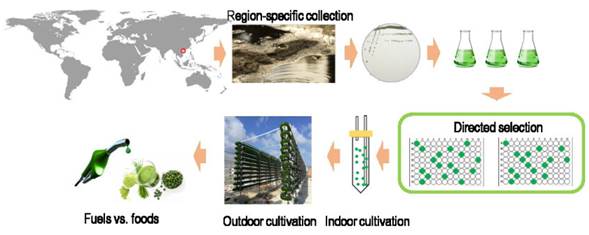区域特色海藻资源开发、工程示范和经济性评价在推动海洋生物创新技术产业化、产品高值化过程中具有重要的意义,同时也是推动藻基“碳中和”技术发展的重要环节。近日,我校海洋学院、南海海洋资源利用国家重点实验室路延笃教授团队在热带海藻种质资源开发、选育和工程化示范方面取得重要进展。该工作于3月11日在线发表于Science of the Total Environment。
The development, engineering demonstration and economic evaluation of tropical algae resources are of great significance in the process of promoting the industrialization of innovative marine biotechnology and creating high-value products, and are also an important link in the development of algae-based “carbon neutrality” technology. Recently, Lu Yandu who is the Professor of the Ocean College and MRU works with his team and has made important progress in the development, selection and breeding, and engineering demonstration of tropical algal germplasm resources, and the related paper was published online in Science of the Total Environment on March 11.
藻类是地球上最主要的初级生产者,是地球碳汇最主要的贡献者之一。海南属热带季风气候,素有“天然大温室”的美称,长夏无冬,具有充足的日照、适宜的气温,通常被认为是藻类学研究和产业化应用的最佳区域之一。然而,在海南岛的海藻产业化过程中同样面临着一些瓶颈。由于夏季长时间的强光照射,户外养殖受到高水平辐射和高温的挑战。此外,热带台风气候导致的较大幅度的光照、温度与盐度波动也给海藻养殖业带来巨大挑战。目前为止,尚没有热带沿海地区对藻类生物技术发展的全方位的、“从种质选育到产品开发”(Cradle-to-grave)的整套技术体系的评估。
Algae are the most important primary producers on earth and one of the most important contributors to the earth’s carbon sink. Enjoying a tropical monsoon climate, Hainan is known as a “natural greenhouse” where enough sunshine and suitable temperatures are appreciated, being considered as one of the best areas for algal research as well as its industrial applications. However, the industrialization of algae in Hainan also faces some bottlenecks. Firstly, the outdoor cultivation is challenged by high radiation and high temperatures due to long periods of intense light exposure in summer. Secondly, the great fluctuations in light, temperature and salinity caused by the tropical typhoon climate also pose great challenges for algae farming. To date, a “cradle-to-grave” assessment of the development of microalgal biotechnology in these areas, not only under the laboratory conditions, but also in the fields has not yet been demonstrated.
我校海洋环境微生物团队通过构建、定向选育热带藻类种质资源,获得一系列对特定环境条件具有高度适应性和工业化潜力的株系。实验室评价表明,其中的小球藻MEM25具备广泛的温度、盐度和光强适应力和高效的海藻蛋白和多不饱和脂肪酸生产性能。之后团队在海南省儋州市和广东省湛江市等地,采用不同类型(密闭式光生物反应器和开放式跑道池)、不同规格(0.5吨、5吨光生物反应器和60吨跑道池)和不同规模(从200平到1万平)的养殖体系,对热带海藻工程化放大过程中的稳定性、高产性和经济性等进行了全面的分析。经过长达两年的户外大规模试验,MEM25在高温、高光、台风等典型的(亚)热带气候条件下可以稳定、高效的将CO2转化为高品质海藻蛋白和多不饱和脂肪酸。喂养MEM25后,受试动物体内的必需氨基酸和多不饱和脂肪酸的水平显著提高,且繁殖和生长速率得到显著改善。1万平米养殖规模的经济性评价显示,在热带海岸带地区,采用开放式跑道池养殖MEM25,用于水产饵料和功能食品开发,可实现创收盈利;同时还可以实现固碳减排与高值产品开发二位一体,推动海洋产业绿色、低碳和可持续发展。上述工作是实现《中国制造2025》之绿色低碳产业发展和“十四五”海洋经济创新发展之特色海洋生物资源高值化开发的重要一环,也为深层次开发不同区域的特色海洋生物资源提供了理论支撑和现实模板。
The team focusing on the microorganisms in the sea has obtained a series of strains that are highly adaptable to specific environment and have potentials for industrialization through creating and screening a (sub)tropical microalgal collection. The results show that a Chlorella strain MEM25 can robustly grow in a wide range of salinities, temperatures and light intensities and can produces high amounts of proteins and polyunsaturated fatty acids (PUFAs) in various conditions. The team then evaluates the economic viability and performance of different scale cultivation system designs (500 L and 5000 L closed photobioreactors, 60,000 L open race ponds, ORPs, and the scales are from 200 to 10,000 ㎡ ) in Danzhou and Zhanjiang. After two-year-long outdoor large-scale trials, MEM25 can stably and efficiently convert CO2 into high-quality proteins and polyunsaturated fatty acids (PUFAs) under typical (sub)tropical climatic conditions such as high temperature, high light and typhoon. After feeding MEM25, the levels of essential amino acids and polyunsaturated fatty acids in the subject animals are significantly increased, and the reproduction and growth rates are significantly improved. The economic evaluation of the 10,000 ㎡cultivation shows that the open race pond cultivation of MEM25 for aquatic bait and functional food development in the tropical coastal zone can be profitable, and it can also achieve carbon sequestration, emission reduction and high-value product development, promoting green, low-carbon and sustainable development of marine industry. The above work is an important part of the green and low-carbon industrial development of Made in China 2025 and the high-value development of special marine biological resources in the innovative development of marine economy proposed by the 14th Five-Year Plan, and it also provides theoretical support and realistic model for the in-depth development of special marine biological resources in different regions.
该研究获得了自然资源部“十三五”海洋经济创新发展示范重点项目“热带海藻高值化产品开发及产业链建设”和国家知识产权局知识产权运营服务体系建设项目“热带海藻产业体系构建和高值化开发高价值组合”等项目的支持。项目实施至今,实现销售1.6亿元,拉动社会投资1.3亿元。在关键技术环节和工程体系,获批国家标准2项,申请专利41项,其中发明专利34项,授权16项,转化1项。海南大学海洋学院2017级硕士生卢香凝、2019级硕士生陈玉婷和中国科学院烟台海岸带研究所崔玉琳副研究员为共同第一作者,海南大学为第一单位,联合中国科学院烟台海岸带研究所、海南绿量微藻生物技术有限公司、中国科学院青岛生物能源与过程研究所、荷兰瓦格宁根大学(Wageningen University and Research)等完成,并得到深圳大学胡强教授、中国科学院南海海洋研究所向文洲研究员、海南大学刘平怀教授、绿量微藻肖玉朋总监、国投集团中国电子工程设计院微藻生物科技中心加晶博士和瓦格宁根大学高风正博士等的帮助。
The research was funded by the “Tropical Algae High-Value Product Development and Industry Chain Construction” of the Project of Innovation & Development of Marine Economy, Ministry of Natural Resources of China, and the “Tropical Algae Industry System Construction and High-Value Development of High-Value Combination” of the Intellectual Property Operation Service System Construction Project of China National Intellectual Property Administration. Since the implementation of the study, it has achieved sales of 160 million yuan and boosted social investment of 130 million yuan. In the key technical links and engineering system, 2 national standards have been approved, and 41 patents have been applied (34 invention patents, 16 authorized patents and 1 patent which has been transformed into commercial tool). Lu Xiangning and Chen Yuting, postgraduates of the Ocean College of Hainan University, and Cui Yulin, associate research professor of Yantai Institute of Coastal Zone Research, Chinese Academy of Sciences, are the co-first authors, and Hainan University is the first unit. This study is completed under the joint efforts of Yantai Institute of Coastal Zone Research, Chinese Academy of Sciences, Hainan GreenEnergy Microalgal Biotechnology Co., Ltd, Qingdao Institute of Bioenergy and Bioprocess Technology, Chinese Academy of Sciences, and Wageningen University and Research. And also, this study gains supports from Professor Hu Qiang from Shenzhen University, Research Professor Xiang Wenzhou from South China Sea Institute of Oceanology, Chinese Academy of Sciences, Professor Liu Pinghuai from Hainan University, Director Xiao Yupeng from Hainan GreenEnergy Microalgal Biotechnology Co., Ltd, Dr. Jia Jing from SDIC Microalgae Biotechnology Center, China Electronics Engineering Design Institute, and Dr. Gao Fengzheng from Wageningen University and Research.

文章链接:https://www.sciencedirect.com/science/article/pii/S0048969721014376
 公众号
公众号